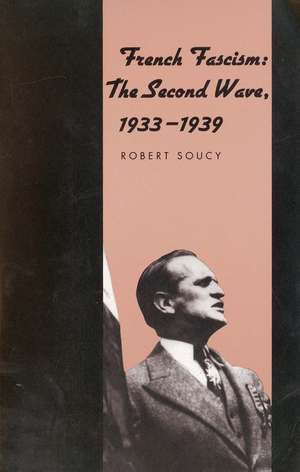French Fascism: The Second Wave, 1933-1939
Autor Robert Soucyen Limba Engleză Paperback – 31 ian 1997
Did fascism have a significant following in France in the 1930s? Were its supporters predominantly from the political right or left? This provocative book, in conjunction with its acclaimed predecessor, French Fascism: The First Wave, demolishes the notion that fascism never took hold in France. Robert Soucy argues that France has a long-standing fascist tradition, one that arose, he argues, more from counterrevolutionary forces on the right than from forces on the left.
Analyzing fascist "double-talk," Soucy underscores the social and economic conservatism of such mass movements as Francisme, the Solidarité Française, the Parti Populaire Français, and the Croix de Feu—as well as the ideological and membership crossovers between them. Examining police reports of the era, he penetrates beneath the "socialist" rhetoric of these movements and describes their financial backing from the steel and electricity industries and the middle- and lower-middle-class constituencies (rather than workers) who provided most of their recruits. Soucy investigates why thousands of French men and women found fascist ideas attractive during this period and what fueled the more authoritarian and brutal aspects of French fascism. According to Soucy, these tendencies (seen most recently in the right-wing activity of Jean-Marie Le Pen's National Front) periodically emerge from perceived threats from "alien" elements in French society—whether they be Communists, Socialists, immigrants, Jews, feminists, hedonists, democrats, or liberals "soft" on Marxism and secularism.
Analyzing fascist "double-talk," Soucy underscores the social and economic conservatism of such mass movements as Francisme, the Solidarité Française, the Parti Populaire Français, and the Croix de Feu—as well as the ideological and membership crossovers between them. Examining police reports of the era, he penetrates beneath the "socialist" rhetoric of these movements and describes their financial backing from the steel and electricity industries and the middle- and lower-middle-class constituencies (rather than workers) who provided most of their recruits. Soucy investigates why thousands of French men and women found fascist ideas attractive during this period and what fueled the more authoritarian and brutal aspects of French fascism. According to Soucy, these tendencies (seen most recently in the right-wing activity of Jean-Marie Le Pen's National Front) periodically emerge from perceived threats from "alien" elements in French society—whether they be Communists, Socialists, immigrants, Jews, feminists, hedonists, democrats, or liberals "soft" on Marxism and secularism.
Preț: 272.14 lei
Nou
Puncte Express: 408
Preț estimativ în valută:
52.12€ • 53.70$ • 43.66£
52.12€ • 53.70$ • 43.66£
Carte tipărită la comandă
Livrare economică 22 februarie-08 martie
Preluare comenzi: 021 569.72.76
Specificații
ISBN-13: 9780300070439
ISBN-10: 0300070438
Pagini: 366
Ilustrații: 15 b-w illus.
Dimensiuni: 156 x 235 x 23 mm
Greutate: 0.55 kg
Ediția:Revised
Editura: Yale University Press
Colecția Yale University Press
ISBN-10: 0300070438
Pagini: 366
Ilustrații: 15 b-w illus.
Dimensiuni: 156 x 235 x 23 mm
Greutate: 0.55 kg
Ediția:Revised
Editura: Yale University Press
Colecția Yale University Press
